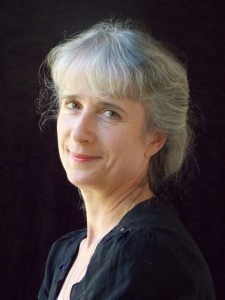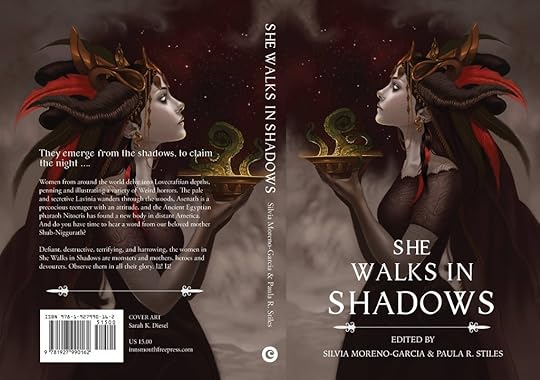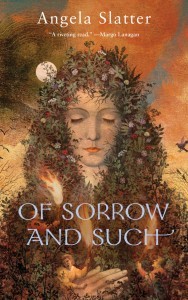Angela Slatter's Blog, page 66
December 20, 2015
And Then interviews: Dan Rabarts
Clan Destine Press is bringing out a new anthology And Then, and you can read interviews with the authors here over the next few weeks. There is also an Indiegogo campaign, to which y’all can contribute here.
 Today, one of New Zealand’s finest, Dan Rabarts, talks about “Tipuna Tapu”.
Today, one of New Zealand’s finest, Dan Rabarts, talks about “Tipuna Tapu”.
What inspired “Tipuna Tapu”?
My iwi is Ngati Porou, and my father maintains our histories, our whakapapa, going back many generations. Over the years, he has been sharing these stories with me, among them the narratives that connect our family to our ancestral lands in the Coromandel. This has included discussions of how the remains of our ancestors were handled and stored, of the tapu, or respect, associated with the bones of the dead, and the sacredness of those places, and those remains. So it’s been brewing for a while, and it was only a matter of time before a story came out, mashed up with taniwha and motorbikes and nailguns.
What appealed to you about this project?
It was nice to have an opportunity to write something with a bit more room for development than a short story without committing to a novel. Plus, it was really nice to be invited, as a Kiwi, to contribute to an Australian anthology, and lend my voice as a New Zealander to the flavour of the collection. And really, when you get asked to write a story full of adventure and excitement to appear alongside a whole raft of other rip-snorting adventure stories, how could I refuse?
What advantages does a long-short form offer?
Writing novellas is a different sort of challenge to short fiction or completing a novel, because while there’s more leeway in terms of word count, you still need to hold together a solid story, maintain convincing characters, and carry the tension through to the end. There’s a risk of overwriting, or trying to do too much, so writing a novella from scratch presented itself both as a chance to stretch out a bit but also as an opportunity to test my own discipline. I’ve set out to write novellas in the past and ended up with incomplete, underdeveloped novel ideas, or really long short stories, but with “Tipuna Tapu” I acheived the balance I was hoping for.
The future of short fiction is …
Bright. I have to say that, I’m a short story writer. But in all honesty, I believe the short story is alive and well, especially that one I have locked up in my bottom drawer and which bangs against the sides at night when it tries to get out.
What’s next for you? 
This year, I focused on completing several incomplete long-form writing projects, including a dark fantasy novel and an urban horror/crime SF novel in collaboration with Lee Murray, which is currently looking for a home. I plan to make sure these are comfortably out in the wild, doing their best to make me a novelist, so then I can look at writing some more short stories. Lee and I also have an anthology of dark speculative fiction from Australia and New Zealand, At The Edge, coming out in 2016 with Paper Road Press, so the first half of next year will be dedicated to promoting that ahead of the release. Really looking forward to the book launches, since we plan to hold one in New Zealand and then another in Aussie. Watch out Australia, here we come. Again.
Dan Rabarts is a writer of fantasy novels and speculative fiction, sometime narrator of podcasts (including stories for the Hugo award-winning StarShipSofa), occasional sailor of sailing things, and father of two wee miracles in a little house on a hill, under the southern sun. In 2014 he received the Sir Julius Vogel Award for Best New Talent. Baby Teeth – Bite-sized Tales of Terror (a horror anthology co-edited with Lee Murray) also won the SJV for Best Collected Work and the Australian Shadows Award for Best Edited Work. His short stories have appeared in venues such as Beneath Ceaseless Skies, Aurealis Magazine, Andromeda Spaceways Inflight Magazine, and on the Parsec Award-winning steampunk podcast Tales from the Archives, among many others.
December 17, 2015
And Then interviews: Jason Franks
Clan Destine Press is bringing out a new anthology And Then, and you can read interviews with the authors here over the next few weeks. There is also an Indiegogo campaign, to which y’all can contribute here.
 In And Then, Jason Franks, author of the excellent Bloody Water, talks “Exli and the Dragon” and the value of Pew-Pew lasers.
In And Then, Jason Franks, author of the excellent Bloody Water, talks “Exli and the Dragon” and the value of Pew-Pew lasers.
What inspired your story/novelette?
Most of the ideas in “Exli and the Dragon” came from brainstorming around Lindy’s brief: two-protagonist adventure stories in any genre. I decided to write an SF piece, because I haven’t written any SF for a few years, and most of the ideas propagated from there. I don’t think there are enough convincing aliens in popular fiction, so I decided to make the narrator a creature who is not even vaguely humanoid. (I guess you’d call Exli a cushion-oid).
I prefer to write characters who are criminals and monsters, so that led me to making the pair of them convicts. I also decided that I wanted a lot of action but not a lot of violence. Exli and the Dragon are not equipped for combat against the more durable species they come up against, and so they have to win their way to freedom with agility and guile. Having said that, I couldn’t resist putting in a bit of Pew-Pew! Space Lasers in Space!
In terms of direct inspiration, I had just read an Iain Banks’ last Culture novel when Guardians of the Galaxy came out at the cinemas and I couldn’t help but wish that he had written the movie, so that became a touchstone for the project as well. Hopefully the result is a drolly humorous jailbreak story set in a space prison.
What appealed to you about this project?
Firstly, the opportunity to work with Lindy Cameron at CDP was a big incentive. Secondly, the brief was really interesting–it’s a different experience to design a story for two protagonists because the way that they interact becomes the principal mechanic of the story. I love to write dialogue so this was the part of the process that I enjoyed the most: learning about these two characters as they went about the business of escaping from prison.
Lindy also suggested that these stories might become serials, and I love me some serial fiction. Most of my novel projects have grown out a desire to write a series of discrete short stories based around a particular character, so this was double the fun.
What advantages does a long-short form offer?
The novelette feels very natural to me these days–I’m not sure I’m still capable of writing anything shorter. I am very interested in exploring ways to compress a big story into a small number of words and many of my recent shorts have been experiments in compression. Perhaps not very successful experiments, it must be said: the most frequent criticism I hear from my writing group is that there’s too much going on for a short, and that I should unpack the story into a novella or a novel. If the story is complex enough there’s just no substitute for word count.
But there’s no trickery in “Exli and the Dragon”. It runs to 9000 words of banter and action. Even so, I only managed to tell half the story I pitched to Lindy. If there’s an opportunity to do another installment, Exli and the Dragon are still up to no good, and so am I.
The future of short fiction is …
… probably not a question I am well-positioned to answer. I don’t write much of it anymore, or if I do, it usually winds up being a comic.
There are a lot of new markets now and I hope that readership starts to grow again. New formats and publication models offer new opportunities, but I think it’s going to be a long time before short fiction has the same level of paying readership that it enjoyed in the 20th century.
What’s next for you? 
I have a short horror/fantasy novel called Shadowmancy coming out very soon and I’m presently trying to get my next book, XDA Zai, ready for submission by the end of January. Also, more Left Hand Path comics, more McBlack comics, and… maybe even a short story or two.
Jason Franks is the author of the occult rock’n’roll novel Bloody Waters and the writer of the Sixsmiths and Left Hand Path and comicbook series. His short fiction has been published in Aurealis, Midnight Echo, After the World, and other places. Franks’ work has twice been short-listed for an Aurealis Award. Find him online at www.jasonfranks.com.
December 16, 2015
And Then interviews: Michael Pryor
Clan Destine Press is bringing out a new anthology And Then, and you can read interviews with the authors here over the next few weeks. There is also an Indiegogo campaign, to which y’all can contribute here.
 In today’s interview the delightful Michael Pryor chats about his And Then tale, “Cross Purposes”.
In today’s interview the delightful Michael Pryor chats about his And Then tale, “Cross Purposes”.
What inspired your story/novelette?
Sometimes my stories kick off with an idea for a character. Sometimes they grow out of a plot idea. But sometimes, it’s a location that gets me thinking. Early 2014, I visited Cooktown in Far North Queensland. The place appealed to me – its remoteness, its history, its sense of being an outpost … When I got home I started researching, and so many gems popped up that I simply had to use. The railway to nowhere? Perfect!
What appealed to you about this project?
I loved the unabashed adventure story aspect of this project. Sadly, gripping, thrilling stories are seen as a bit passé, a bit naff, but I’ve always loved them. Derring-do, hair’s breadth escapes, noble sacrifices, this sort of thing is guaranteed to keep me reading, and so I couldn’t turn down an invitation to write in this mode.
What advantages does a long-short form offer?
I find that the long-short form is a great boon to pacing. No time to sag in the middle, gotta keep moving!
The future of short fiction is …
Robust. Online publishing offers a variety of niche opportunities that traditional print publishing can’t. Whereas hard copy publishers are reluctant to go with a short story collection, online’ s cheaper costs can make it viable.
What’s next for you? 
I’m working on a number of YA projects, with an urban fantasy due for release in 2017, from Allen and Unwin. And I’m still working on my first adult novel, one with plenty of derring-do, exotic locations, 1930s ambience and some crafty magic. Stay tuned.
Michael Pryor writes fantasy and science fiction, mostly for teenagers. He has published more than thirty novels and 50 something short stories. He is one of the co-publishers of Aurealis, Australia’s longest running Fantasy and SF magazine. He has been shortlisted for the Aurealis Award six times, and seven of his books have been CBCA Notable books. His website is www.michaelpryor.com.au.
December 15, 2015
And Then interviews: Amanda Pillar
Clan Destine Press is bringing out a new anthology And Then, and you can read interviews with the authors here over the next few weeks. There is also an Indiegogo campaign, to which y’all can contribute here.
 Today author, editor, and archaeologist Amanda Pillar talks about her story “It”.
Today author, editor, and archaeologist Amanda Pillar talks about her story “It”.
What inspired your story/novelette?
Funnily enough, this story was inspired by a dream I had years ago. I don’t remember a whole lot of it, but I do recall a scene set in an inn, the taproom filled with people, where a cup of water rippled (like on Jurassic Park). And then it was coming, but I wasn’t sure what it was, just that everyone had to get away…
What appealed to you about this project?
I loved the idea of an anthology dedicated to action stories. I want to read this collection! (And edit it – brain, why hadn’t you thought of this before?).
What advantages does a long-short form offer?
I think the long-short form provides a way for a ‘small’ idea to be explored in greater detail. It also allows for more characters and more comprehensive world-building. Some stories can be told quickly, poignantly, and expertly within 5,000 words. Other need more space to grow and develop. I really enjoyed watching this story emerge, inspired by my sleeping imagination!
The future of short fiction is …
I think it is exciting. Every year we see new anthologies, new stories, new authors emerging. It’s a place where talent can be discovered or where it can be honed. I love it!
What’s next for you? 
I have a novella coming out in February 2016! It’s called Captive, and is the prequel to my novel Graced. I’m really excited to share more about the Graced world with readers!
Amanda Pillar is an award-winning editor and author who lives in Australia, with her husband and two cats. Amanda is the author of the novel Graced (2015), and the novella Captive. Amanda has had numerous short stories published and has co-edited six fiction anthologies and solo-edited two: Bloodstones and Bloodlines. She works as an archaeologist.
December 14, 2015
And Then interviews: Sarah Evans
Clan Destine Press is bringing out a new anthology And Then, and you can read interviews with the authors here over the next few weeks. There is also an Indiegogo campaign, to which y’all can contribute here.
 Sarah Evans talks “Plumbing the Depths” and the killing heat of Australian Christmases.
Sarah Evans talks “Plumbing the Depths” and the killing heat of Australian Christmases.
What inspired your story/novelette?
“Plumbing the Depths” kicked off because of homesickness as I suffered yet another Christmas in a hot climate. Being an ex-pat, I was feeling nostalgic about white Christmases and winter in general. Memories surfaced of snow and ice and tobogganing and feeling really, really cold while I sweated in my non-airconditioned study… Actually, I often write about wintery things in the depths of summer. It must be therapy.
I was also brought up o a healthy diet of horror flicks and stories and had long fancied writing a tale about a vegetarian-turned-vampire (this was years before the Twilight phenomenon). I wrote a thousand or so words and then life got in the way, as it often does.
Fast forward to Lindy and her invitation for And Then, and I was back into chilly winter and blood suckers and this time determined to get the story finished.
What appealed to you about this project?
The challenge! Lindy threw down the gauntlet to write a rollicking adventure story. The scope was massive. How could one resist?
What advantages does a long-short form offer?
Novellas are a good length for me. Like short stories, they are very doable in a chaotic life. I’ve written several romance novellas for My Weekly over the years. These are now published as large print books in the library system.
A novella gives one enough room to explore and expand the characters and is short enough to try out ideas which may not be meaty enough for a novel. And they don’t need as much head space as a novel. Novels do tend to sabotage the brain cells and take over your life.
So when Lindy issued the invitation, I jumped at it. It was an ideal project to resurrect my vampire slayers and have a play. It was soooo much fun.
The future of short fiction is …
Healthy, extremely so. People lead busy lives and short fiction is accessible. It can be shoe-horned in between the essentials. There’s the added bonus that you can read a story in one hit which maintains its continuity AND you don’t feel (too) guilty for spending too much time in a fictitious realm.
What’s next for you? 
After all this talk about short fiction, I won’t be doing it!
My plan is to get cracking on the sequel to my rom-com crime novel Operation Paradise. It’s been bubbling on the back burner for some months now and I do really need to get it done and dusted. People keep hounding me to find out what happens next. I need to get them off my back :).
Sarah Evans, an English ex-pat journalist and home-schooling mum, is the author of a lifestyle/recipe book Seasons and Seasonings in a Teapot, romance and crime novels, short stories and poetry. She writes for the UK women’s magazine market and her stories have been broadcast on ABC Radio and published in crime and romance anthologies. She also writes songs with her singer-songwriter daughter.
Sarah teaches creative writing, edits for a children’s book publisher and is the convenor of Bridgetown’s Words in the Valley, a grassroots readers and writers festival.
Last year CDP published Sarah’s debut crime novel Operation Paradise and three short story ebook collections, Killing Kindness (crime), Call of the Wild (fantasy) and New Blood (horror). Her novella Plumbing the Depths is included in the And Then adventure anthology.
Goodreads Giveaway: She Walks in Shadows
 Okay, I’m giving away a copy of the She Walks in Shadows anthology, edited by Silvia Moreno-Garcia and Paula R. Stiles. This is an Australia only giveaway because the cost of postage elsewhere means I wouldn’t be able to eat for two weeks.
Okay, I’m giving away a copy of the She Walks in Shadows anthology, edited by Silvia Moreno-Garcia and Paula R. Stiles. This is an Australia only giveaway because the cost of postage elsewhere means I wouldn’t be able to eat for two weeks.
Go here to enter; the comp closes at midnight on 22 Dec 2015.
The ToC:
“Bitter Perfume” Laura Blackwell
“Violet is the Color of Your Energy” Nadia Bulkin
“Body to Body to Body” Selena Chambers
“Magna Mater” Arinn Dembo
“De Deabus Minoribus Exterioris Theomagicae” Jilly Dreadful
“Hairwork” Gemma Files
“The Head of T’la-yub” Nelly Geraldine García-Rosas (translated by Silvia Moreno-Garcia)
“Bring the Moon to Me” Amelia Gorman
“Chosen” Lyndsey Holder
“Eight Seconds” Pandora Hope
“Cthulhu of the Dead Sea” Inkeri Kontro
“Turn out the Light” Penelope Love
“The Adventurer’s Wife” Premee Mohamed
“Notes Found in a Decommissioned Asylum, December 1961? Sharon Mock
“The Eye of Juno” Eugenie Mora
“Ammutseba Rising” Ann K. Schwader
“Cypress God” Rodopi Sisamis
“Lavinia’s Wood” Angela Slatter
“The Opera Singer” Priya Sridhar
“Provenance” Benjanun Sriduangkaew
“The Thing in The Cheerleading Squad” Molly Tanzer
“Lockbox” E. Catherine Tobler
“When She Quickens” Mary Turzillo
“Shub-Niggurath’s Witnesses” Valerie Valdes
“Queen of a New America” Wendy N. Wagner
Of Sorrow and Such Giveaway – open to NZ
 So I’ve opened the Goodreads giveaway of Of Sorrow and Such to New Zealand as well as Australia – enter here!
So I’ve opened the Goodreads giveaway of Of Sorrow and Such to New Zealand as well as Australia – enter here!
December 13, 2015
And Then interviews: Andrew Nette
Clan Destine Press is bringing out a new anthology And Then, and you can read interviews with the authors here over the next few weeks. There is also an Indiegogo campaign, to which y’all can contribute here.
 Today Melbourne Crime writer Andrew Nette talks about “Save a Kiss for Satan”.
Today Melbourne Crime writer Andrew Nette talks about “Save a Kiss for Satan”.
What inspired your story/novelette?
Satanism and the occult were major pre-occupations in popular culture in the late sixties and early seventies. Some scholars have linked it to regular outbreaks of occult-related mania that have historically occurred during periods of great social dislocation and social change. Whatever the reason, Satanism was a major theme of a lot of films, from popular mainstream features, such as film Rosemary’s Baby (1968), The Exorcist (1973) and The Omen (1976), to more sensationalist exploitation fare, for example Devil’s Rain (1975), Brotherhood of Satan (1971), The Witches (1966) and Race with the Devil (1975).
My story “Save a Last Kiss For Satan” concerns a tough female cop who thinks she’s being haunted by her long dead explorer occultist uncle, and enlists the aid of a drug addled magician and his punk sidekick. It is inspired by watching far too many of these films, as well as pulp novels and comics with occult themes.
What appealed to you about this project?
Fiction wise I consider myself a crime writer. Science fiction, fantasy, spec fiction, I like to read it sometimes, but none of these are my natural home in terms of what I write myself. I could’ve done a crime story for this anthology, but I wanted to do something that stretched me. A story about a cop, a magician and a punk, who – reluctantly – join forces to battle the forces of Satan, did exactly that.
What advantages does a long-short form offer?
From the point of view of me the writer, long form offers me the ability to do something that has some meat in it plot wise, but which is not too long and is able to be written quickly and delivered to the editor. I was able to play around a bit in “Save a Last Kiss For Satan” with some of the common tropes of horror fiction, flesh out the detail of the story, but I still had to work within the discipline of short fiction.
The future of short fiction is …
Getting better and better, although Australia’s short fiction market still has a bit of catching up to do with other countries, particularly the US. I have written stories for anthologies and short story websites in the US, where there is much more of a sense of a short fiction community, in crime fiction, anyway. There are always really exciting anthology projects popping up that feature not only up and coming writers but very established and successful authors. This is not the case in Australia, which is what makes And Then… such an exciting project and why I wanted to be a part of it.
What’s next for you? 
2016 is a busy year for me. In addition to being in two anthologies, including And Then… I have two books coming out. The first is a non-fiction book I’ve co-edited with another Melbourne writer. It’s called Beat Girls, Love Tribes and Real Cool Cats: Pulp Fiction & Youth Culture from the 1950s to 1980s and as the title says, it’s a history of pulp fiction has depicted young people, from juvenile delinquents to punks and skinheads. My co-editor and I are hard at work on the second volume, which deals with pulp and popular fiction influenced by the radical movements of the nineteen sixties and seventies. Later in the year my second novel, Gunshine State, will come out. The heist story is much neglected in Australian crime fiction and I’ve always wanted to try my hand at writing one that is hardboiled, intelligent and uniquely Australian. Gunshine State is my attempt to do this.
Andrew Nette is a writer, reviewer, film lover and pulp scholar, based in Melbourne, Australia.
He is the author of two novels, Ghost Money, a crime story set in Cambodia in the mid-nineties, published by Hong Kong based publisher, Crime Wave Press, and Gunshine State, out through 280 Steps in the second half of 2016. He is co-editor of Beat Girls, Love Tribes and Real Cool Cats: Pulp Fiction and Youth Culture, from the 1950s – 1980s, forthcoming from Verse Chorus Press.
He is one of the founders of Crime Factory Publications, a small Melbourne-based press specialising in crime fiction. He co-edits its magazine Crime Factory, and co-edited Hard Labour, an anthology of Australian short crime fiction, and LEE, an anthology of fiction inspired by American cinema icon Lee Marvin. His short fiction has appeared in a number of print and on-line publications, including Beat to a Pulp Hardboiled 3, Shotgun Honey Presents: Both Barrels, Blood and Tacos, The One That Got Away, Phnom Penh Noir and Crime Factory Hard Labour.
His online home is www.pulpcurry.com. You can find him on Twitter at @Pulpcurry.
December 12, 2015
Goodreads Giveaway: Of Sorrow and Such
 I’ve set up a Goodreads giveaway for a copy of Of Sorrow and Such – Australia only, folks, as overseas postage costs kill my budget at this point, but I’ll run a couple of UK/Eur/US comps in the new year.
I’ve set up a Goodreads giveaway for a copy of Of Sorrow and Such – Australia only, folks, as overseas postage costs kill my budget at this point, but I’ll run a couple of UK/Eur/US comps in the new year.
So, go here to enter.
Mistress Gideon is a witch. The locals of Edda’s Meadow, if they suspect it of her, say nary a word-Gideon has been good to them, and it’s always better to keep on her good side. Just in case.
When a foolish young shapeshifter goes against the wishes of her pack, and gets herself very publicly caught, the authorities find it impossible to deny the existence of the supernatural in their midst any longer; Gideon and her like are captured, bound for torture and a fiery end.
Should Gideon give up her sisters in return for a quick death? Or can she turn the situation to her advantage?
PRAISE FOR OF SORROW AND SUCH
“Of Sorrow and Such takes you to dark, unsettling places. Angela Slatter’s magic is earthy, bodily and beleaguered; in the hands of tough, clever Patience Gideon it’s a powerful instrument for wresting justice from a hostile world. A riveting read.” — Margo Lanagan, World Fantasy Award winning author of Black Juice and Sea-Hearts
December 10, 2015
And Then interviews: Jason Nahrung
Clan Destine Press is bringing out a new anthology And Then, and you can read interviews with the authors here over the next few weeks. There is also an Indiegogo campaign, to which y’all can contribute here.
 One of my favourite people is Jason Nahrung, and he takes some time out today to discuss his And Then tale.
One of my favourite people is Jason Nahrung, and he takes some time out today to discuss his And Then tale.
1. What inspired “The Pelican Club?
My story, “The Pelican Club”, is a further exploration of a paranormal urban Brisbane I first visited in “Night Blooming” (2015); I’m using short stories to develop the characters and the world with a view to a fully fledged novella, tantalisingly close to revealing its full narrative to me. The idea for the world came out of a submission call for another publisher’s anthology series themed on “blood”, but it took me so long to sidestep my default vampire setting that I totally missed that call (twice*). I think it was the fangs that led me to the naga, and the naga that led me to the pisacha, so I haven’t got that far away from the vampires after all. Funnily enough, the original scene that got me into this storyworld still hasn’t made it into an actual story, and possibly never will.
2. What appealed to you about this project?
What’s not to like about an adventure (cue Pseudo Echo!)? I remember (in fact, still have) the old-style adventure yarns I read in “Adventure Stories for Boys” or some equally gender-biased anthology when I was a kid: this compendium isn’t like that, except perhaps in spirit. Here was a chance to write a long short story (finally, a market over 5,000 words!) to indulge some derring-do, some noir, some urban fantasy. And I had a dynamic duo all ready to rock.
3. What advantages does a long-short form offer?
It’s satisfying to be able to stretch the wings a little, to have room for the story to get a little muddy. In a short, say, 2,000-5,000 words, there’s not a lot of room for the untidy bits of the story – the extra character who adds colour or a different perspective, a bit of insight, for instance; everything has to serve the immediate story. So being able to indulge in a little scene setting, a little character byplay, perhaps a subplot or the hint of one, is really welcome. Especially when the story has associations with others, so you can play with linkages to reward the reader who has familiarity with the storyworld, without confusing the reader who does not.
4. The future of short fiction is …
Long. As a reader, the well-crafted short can be so rewarding, and as a writer, while the form challenges the hell out of me (always a good thing, and indeed, it’s a good place to experiment), getting the occasional sale props up my ego and reminds me, and presumably readers, that I’m still alive. Plus, some stories are just best told short.
5. What’s next for you?
I have this pesky PhD taking up most of my time – I’m writing a short story suite set in climate-changed Brisbane (no supernatural elements) so that’s a challenge on a number of fronts. But Shane and Manasa are still knocking on the door for another outing …
* Do check out Bloodstones and Bloodlines, both from Ticonderoga Publications, for some “bloody” good yarns.
Jason Nahrung grew up on a Queensland cattle property and now lives in Ballarat with his wife, the writer Kirstyn McDermott. He works as an editor and journalist to support his travel addiction. His fiction is invariably darkly themed, perhaps reflecting his passion for classic B-grade horror films and ’80s goth rock. His most recent long fiction is the Gothic tale Salvage (Twelfth Planet Press) and 2015’s outback vampire duology Blood and Dust and The Big Smoke (Clan Destine Press). He lurks online at www.jasonnahrung.com.



